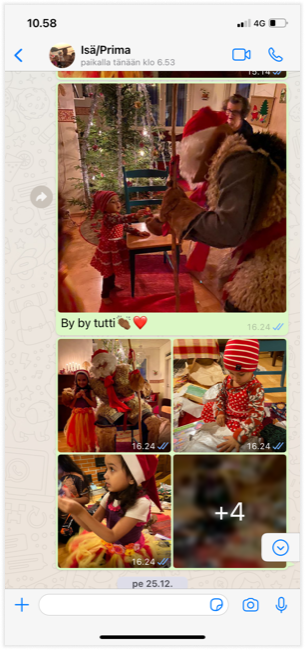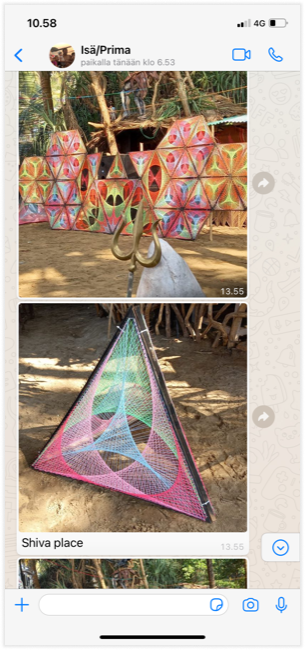


MAIN INFORMATION
Matleena Kokko, Finland.
Premanand Shivram Agarwadeker, India.
Matleena met Premanand in India in 2005, and they have been together for 15 years. They are not married but have four young children: a daughter, aged 14, a son aged 11, and another two daughters aged five and two.
Because of Covid-19, they last saw each other on 11 January 2020 at Goa airport, India, when they said goodbye.
They are currently 6,542 km apart.
Premanand Shivram Agarwadeker, India.
Matleena met Premanand in India in 2005, and they have been together for 15 years. They are not married but have four young children: a daughter, aged 14, a son aged 11, and another two daughters aged five and two.
Because of Covid-19, they last saw each other on 11 January 2020 at Goa airport, India, when they said goodbye.
They are currently 6,542 km apart.
STORY OF SEPARATION
“In Finnish law, we are nothing,” says Matleena. She lives in Finland with her four children. Covid-19 has separated them from their father, her husband, since the start of 2020. “We don’t have a name for our relationship. Because we are not married, but we still have children. And we do not live together at the same address. So it makes our story much more difficult to explain. They [immigration officials] don’t understand why we want to stay like this.” But, the set-up is something they choose; Premanand has a successful business in Goa, which it would have been difficult for him to leave when they got together 15 years ago. “[And going between India and Finland] was best for the children as they can see these two cultures growing up, and, when they are adults, decide where they want to go,” continues Matleena, who is Christian, while Premanand is Hindu.
The arrangement worked when there were set-dates for the family reuniting. Now the uncertainty weighs heavily on them. “It makes me very sad. I don't know how being separated from her father for so long will affect her,” she continues, referring to her eldest child, who has not seen Premanand in over two years. The family calls each other multiple times a day, despite the often shaky signal. Their five-year-old daughter draws pictures for her father, which Matleena collects in a box. “I try to send him everything I possibly can so that he can follow the growth of his children,” she says.
The arrangement worked when there were set-dates for the family reuniting. Now the uncertainty weighs heavily on them. “It makes me very sad. I don't know how being separated from her father for so long will affect her,” she continues, referring to her eldest child, who has not seen Premanand in over two years. The family calls each other multiple times a day, despite the often shaky signal. Their five-year-old daughter draws pictures for her father, which Matleena collects in a box. “I try to send him everything I possibly can so that he can follow the growth of his children,” she says.









“Family reunification must not be vilified. It is an unshakable need, the core draw to be with your loved ones particularly during a worldwide crisis, not in spite of it. COVID-19 will be with us for a long time. We must prepare and plan to both protect life and live life. Family may keep the world together in a time when we have lost so much. Mental health has suffered. Families have suffered. People have suffered.”
Dr. David Edward-Ooi Poon, Founder of the Faces of Advocacy
“Family reunification must not be vilified. It is an unshakable need, the core draw to be with your loved ones particularly during a worldwide crisis, not in spite of it. COVID-19 will be with us for a long time. We must prepare and plan to both protect life and live life. Family may keep the world together in a time when we have lost so much. Mental health has suffered. Families have suffered. People have suffered.”
Dr. David Edward-Ooi Poon, Founder of the Faces of Advocacy

TIME APART
Every year, Premanand applies for a tourist visa to visit his family for three months (usually June, July and August) in Finland; Matleena and their children do the same, travelling to see him in India for three months over Christmas. The pandemic prevented this, and Premanand was unable to travel to Finland in the summer of 2020. He has not been able to see his family since.
The couple has repeatedly tried to reunite, petitioning Finish immigration with little luck. At the start of the pandemic, Matleena emailed the Embassy of Finland, New Delhi, explaining that she was alone with four children and asking if Premanand could be issued a visa to join them in Finland. Finland had suspended ordinary visa and residence permit applications across its embassies. Almost two months later, Matleena received a curt response stating: “The Embassy is not issuing visas at the moment and it is not possible to travel to Finland with a visa now.” Matleena also emailed the Ministry of Foreign Affairs in Finland, expressing similar concerns and asking whether they could issue Premanand an emergency visa. But on the same day, she received a short email stating that they were still suspending the receipt of visa applications due to Covid-19.
In December 2020, the Finnish embassy in New Delhi issued a statement, which explained that all Finnish missions abroad would begin accepting visa applications submitted by representatives of defined special groups. Special groups included individuals applying for a visa based on family ties or an established relationship. “Prema can apply for a three-month tourist visa again for family reasons, but nothing else,” explains Matleena. She called the Finnish embassy in Delhi, India, asking if it would be possible to apply for an extended visa, which would be valid over the next two years but that Premanand would only use on a limited basis. “I told them about Covid-19 and how it has separated us for over a year,” she continues. “But they said it is not possible. The woman on the phone just wondered why we live like this? It is frustrating having to explain that this is how we want to live.”
The couple has repeatedly tried to reunite, petitioning Finish immigration with little luck. At the start of the pandemic, Matleena emailed the Embassy of Finland, New Delhi, explaining that she was alone with four children and asking if Premanand could be issued a visa to join them in Finland. Finland had suspended ordinary visa and residence permit applications across its embassies. Almost two months later, Matleena received a curt response stating: “The Embassy is not issuing visas at the moment and it is not possible to travel to Finland with a visa now.” Matleena also emailed the Ministry of Foreign Affairs in Finland, expressing similar concerns and asking whether they could issue Premanand an emergency visa. But on the same day, she received a short email stating that they were still suspending the receipt of visa applications due to Covid-19.
In December 2020, the Finnish embassy in New Delhi issued a statement, which explained that all Finnish missions abroad would begin accepting visa applications submitted by representatives of defined special groups. Special groups included individuals applying for a visa based on family ties or an established relationship. “Prema can apply for a three-month tourist visa again for family reasons, but nothing else,” explains Matleena. She called the Finnish embassy in Delhi, India, asking if it would be possible to apply for an extended visa, which would be valid over the next two years but that Premanand would only use on a limited basis. “I told them about Covid-19 and how it has separated us for over a year,” she continues. “But they said it is not possible. The woman on the phone just wondered why we live like this? It is frustrating having to explain that this is how we want to live.”
“They need their time with me now. When they grow up they don’t need their parents as much. Now they need me. Also I feel that one mother cannot handle four children alone. This is really stupid, they have to understand. This is tough, the children miss me more and the Finnish Government has to do something for all the family members abroad and not just think business, business, business, visa, money, money, money.”
Premanand Shivram Agarwadeker
“They need their time with me now. When they grow up they don’t need their parents as much. Now they need me. Also I feel that one mother cannot handle four children alone. This is really stupid, they have to understand. This is tough, the children miss me more and the Finnish Government has to do something for all the family members abroad and not just think business, business, business, visa, money, money, money.”
Premanand Shivram Agarwadeker





